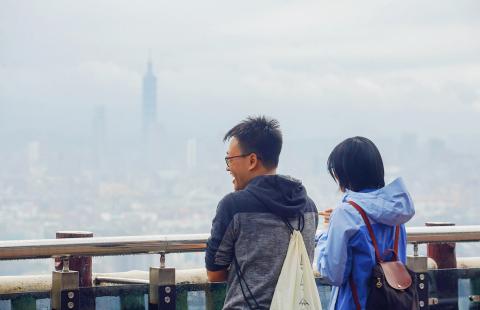The Environmental Protection Administration (EPA) yesterday announced draft guidelines that outline which breaches of the Air Pollution Control Act (空氣污染防制法) would bring the maximum fine of NT$20 million (US$648,677), saying fines could be calculated according to the frequency of violations.
The maximum fine was increased from NT$1 million after amendments to the law took effect in August last year, the EPA said, adding that its guidelines outline situations that would warrant the new maximum fine.
Serious breaches include pollution emitters that do not have permits, those that fail to halt operations as ordered and those that repeatedly contravene the act after being told to improve twice within a year, it said.

Photo: CNA
Other breaches that could draw the maximum fine are factories that emit large amounts of air pollutants that seriously affect air quality, those that emit hazardous air pollutants, endangering public health, and those that emit pollutants via unlicensed outlets, the EPA said.
Authorities would be empowered to issue fines according to the frequency of violations, not just how many days a violation lasts, Department of Air Quality Protection and Noise Control Director-General Wu Sheng-chung (吳盛忠) said.
The minimum fine for a minor violation, such as burning in an open space, was reduced from NT$5,000 to NT$1,200 in a bid to make the penalty more proportionate, Wu said.
The draft regulations entail a 30-day notification period for members of the public to express their opinion, while the agency would subsequently hold public forums, Wu said.
The agency is also preparing amendments to allow it to confiscate unlawful revenue from those that contravene the rules, the EPA said.

Taiwanese can file complaints with the Tourism Administration to report travel agencies if their activities caused termination of a person’s citizenship, Mainland Affairs Council Minister Chiu Chui-cheng (邱垂正) said yesterday, after a podcaster highlighted a case in which a person’s citizenship was canceled for receiving a single-use Chinese passport to enter Russia. The council is aware of incidents in which people who signed up through Chinese travel agencies for tours of Russia were told they could obtain Russian visas and fast-track border clearance, Chiu told reporters on the sidelines of an event in Taipei. However, the travel agencies actually applied

Japanese footwear brand Onitsuka Tiger today issued a public apology and said it has suspended an employee amid allegations that the staff member discriminated against a Vietnamese customer at its Taipei 101 store. Posting on the social media platform Threads yesterday, a user said that an employee at the store said that “those shoes are very expensive” when her friend, who is a migrant worker from Vietnam, asked for assistance. The employee then ignored her until she asked again, to which she replied: "We don't have a size 37." The post had amassed nearly 26,000 likes and 916 comments as of this

New measures aimed at making Taiwan more attractive to foreign professionals came into effect this month, the National Development Council said yesterday. Among the changes, international students at Taiwanese universities would be able to work in Taiwan without a work permit in the two years after they graduate, explainer materials provided by the council said. In addition, foreign nationals who graduated from one of the world’s top 200 universities within the past five years can also apply for a two-year open work permit. Previously, those graduates would have needed to apply for a work permit using point-based criteria or have a Taiwanese company

The Shilin District Prosecutors’ Office yesterday indicted two Taiwanese and issued a wanted notice for Pete Liu (劉作虎), founder of Shenzhen-based smartphone manufacturer OnePlus Technology Co (萬普拉斯科技), for allegedly contravening the Act Governing Relations Between the People of the Taiwan Area and the Mainland Area (臺灣地區與大陸地區人民關係條例) by poaching 70 engineers in Taiwan. Liu allegedly traveled to Taiwan at the end of 2014 and met with a Taiwanese man surnamed Lin (林) to discuss establishing a mobile software research and development (R&D) team in Taiwan, prosecutors said. Without approval from the government, Lin, following Liu’s instructions, recruited more than 70 software